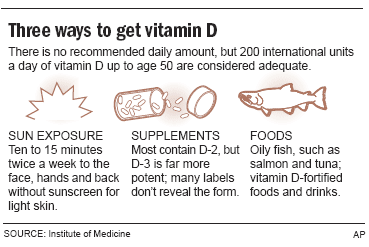This cold and flu season, vitamin D has become my new obsession. It all started last summer at the Catonsville Birth, Baby and Family expo (check out my
blog post). I was minding my own business at my little booth, when I was accosted by an unkempt fellow. He started right in. "What is the leading cause of illness in the United States? Lack of vitamin D" You name it; infertility, autism, cancer, heart disease, allergies, auto-immune disease; was all to blame because of lack of vitamin D. Somehow he hooked me. I had no idea who he was or what his deal was, but something about what he was saying pulled me in. So I, uninformed, got onto the vitamin D train. My hubby was all about it too. I guess I was just as convincing as, what we now affectionately call that random guy, "Vitamin D Man". We ordered supplements, skipped the flu shot and were full into the vitamin D "thing".
Just recently, I decided to look into vitamin D some more. Here is some of what I found.
What is vitamin D?
Vitamin D isn't really a vitamin at all. It is a hormone that plays a central role in healthy bones, muscles, immune system, cardiac system and neurological function. Vitamin D is produced in your skin, triggered by the UVB portion of sunlight and activated by your liver and kidneys. There are vitamin D receptors on almost all of the cells in the human body from the bones to the brain. Many scientist believe that vitamin D controls cell growth. If that is true then you can see why vitamin D plays a huge role in the health and function of the body as a whole.
What is the source of vitamin D?
- The biggest source to help your body make vitamin D is the sun. Sun triggers the production of vitamin D in your skin, however, if you apply sunscreen, the UVB (and UVA for that matter) is blocked out and therefore your skin will not make as much vitamin D. Even with a sunscreen as low as SPF 8, the UVB portion of light will be 90% blocked from your body, therefore significantly decreasing the amount of vitamin D your body can make. The amount of sun you need to make enough vitamin D during the summer months depends on your skin tone, latitude where you live, and the month. Vitamin D calculator
- You can also get vitamin D through your diet. Oily fish and milk or juice fortified with vitamin D are the main dietary sources of vitamin D.
- Supplementing is another way to get vitamin D. When looking for vitamin D supplement, choose one with D-2 or D-3.
It is also important to make sure you get enough calcium in your diet since vitamin D and calcium work together to make your body healthy. I will leave calcium for another blog post.
Vitamin D made in the skin (triggered by the sun) lasts twice as long in the body as if it were acquired through diet or supplements.
What role does vitamin D play in health?
- Bone Health: prevents osteoporosis, rickets and fractures
- Cellular Health: prevents some cancers, some infectious disease, and asthma
- Organ Health: prevents heart disease, stroke, type 2 diabetes, and tooth loss
- Muscular Health: supports healthy muscles
- Autoimmune Health: prevents MS, type 1 diabetes, and Crohn's disease
- Brain Health: prevents depression, schizophrenia, and dementia
- Mood-related Health: prevents seasonal affect disorder, PMS and sleeping disorders
This diagram pretty much sums it up:
Why is vitamin D vital during pregnancy and lactation?
Since growing babies in utero receive their vitamin D from the mother, it is crucial that the mother has enough vitamin D for her and the baby during pregnancy. The same goes for breastfeeding mothers. The mothers themselves make the vitamin D for their babies until they are old enough to make their own. Mothers who are vitamin D deficient will have babies who are vitamin D deficient. To read more about vitamin D and breastfeeding click
here.
What are the main take aways about vitamin D?
- The best source of vitamin D is through sun exposure. About 10-15 minutes of noon-time sun (again depending on latitude and skin type) exposure during the summer months (without sunscreen) is enough for your body to store enough vitamin D for the winter.
- Vitamin D and calcium are best friends!
- Vitamin D affects your whole body, not just your bones.
- It is vitally important for pregnant or lactating mothers to have sufficient vitamin D levels so they can pass that to their babies.
Come on summer!!
Most of the information in this blog post came from The Vitamin D Solution by Michael F. Holick, Ph.D., M.D.






















